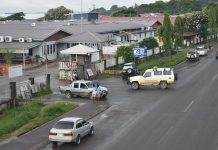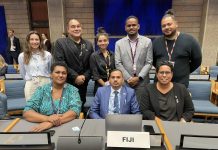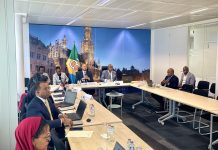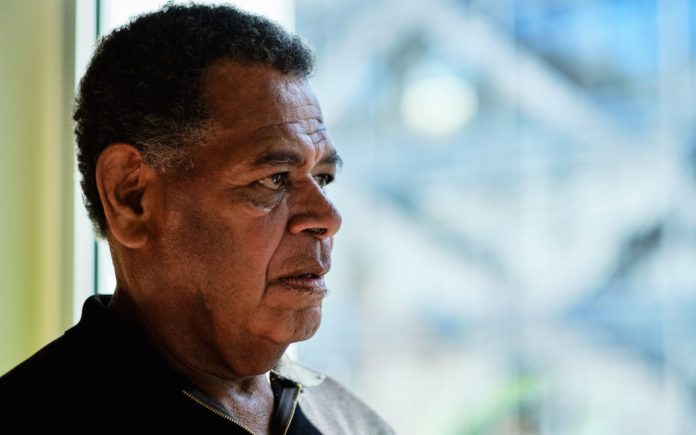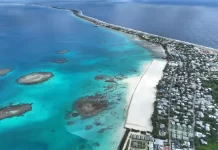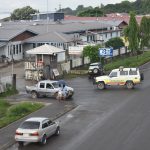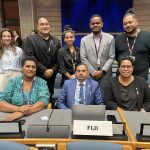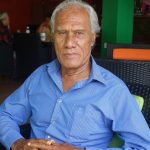New Caledonia’s largest pro-independence party has been told that France is panicking and afraid of losing New Caledonia.
The head of the Caledonian Union Daniel Goa briefed the party in Koumac after a week of meetings of a cross-section of New Caledonian politicians with the French government in Paris earlier this month.
Goa said Paris kept reneging on earlier undertakings by pressing ahead with efforts to undo the 1998 Noumea Accord on the territory’s decolonisation in order to maintain its international influence.
He said there was major incomprehension on part of the French government of what the bilateral talks in Paris were supposed to be about.
Goa said Paris wanted concrete decisions in circumstances favouring the French government.
However, Goa said the decolonisation process and New Caledonia’s accession to sovereignty would be discussed in New Caledonia.
He again warned France against opening up the restricted electoral roll used for provincial elections.
Anti-independence parties have urged Paris to extend voting rights for the 2024 elections after the 2021 referendum saw a majority of voters reject full sovereignty.
The pro-independence side, however, largely abstained from the vote in 2021 because of the pandemic and still refuses to recognise the result as the legitimate outcome of the decolonisation process.
Under the terms of the Noumea Accord voting in provincial elections is restricted to indigenous Kanaks and those who have been residents in the territory since 1998.
About 40,000 French citizens are excluded from provincial elections but can take part in France’s parliamentary and presidential elections.
Goa warned of what he called irreversible solutions if France imposed a change to the rolls, adding that there would be a risk of there never being any election.
He said the survival of the Kanaks hinged on this issue.
Goa said opening the roll to recent arrivals would create a new imbalance and extinguish the Kanaks’ vision of politics.
He stressed that the Kanaks would no longer allow the colonial state to impose itself.
Goa said the French state was pushing the Kanaks to their last entrenchments, but they would be present in their own way to take responsibility to liberate their country.
Goa said the Kanaks’ sovereignty was no longer negotiable, adding that the land is not a land of France and will never be a land of France.
He said it was a shame to imagine the worst, but France was going against the ‘wind of history’ as the United Nations kept calling for the eradication of colonialism.
Goa said France had to choose between moving in the direction of history or ending up in the rubbish bin of colonial history.
He put Paris on notice that a refusal to restore the territory’s sovereignty would drive the Kanak people to seek support elsewhere.
Goa said France didn’t and wouldn’t recognise the Kanaks’ rights, which would prompt the pro-independence camp to turn to new allies.
He said all major powers were around the Pacific rim but France, as only a small European country, was lonely in the Pacific.
Goa said the French army never defended New Caledonia when it was threatened, but only killed Kanaks, plundered their land, carried out punitive expeditions, brutally treated and displaced Kanak populations, and killed their elders.
He also castigated President Emmanuel Macron’s China policy, asking whether France could be trusted.
Goa said France still wanted to give the illusion of existing in a concert of nations but the President, out of clumsiness, betrayed his European and American allies by pledging allegiance to China.
He said in the Pacific context, France would on one hand sell New Caledonia to China and on the other hand, France kept saying not to deal with China in whatever way, brandishing the ‘Chinese threat’ as the worst thing that could happen.
Goa said with the French presidency and the country adrift, there was a risk for New Caledonia to be dragged into a void.
Daniel Goa’s speech was criticised by a leading anti-independence politician Sonia Backes who regarded Goa’s comments about the electoral rolls as a call to violence.
Backes, who is the president of the Southern Province and a junior member of the French government, told La Premiere Goa’s threats of action in case of changes to the rolls were unacceptable.
She also took issue with Goa’s warning that the Kanaks would ally themselves with other powers, should their ambition to attain independence be thwarted by France.
Backes said the anti-independence coalition had referred the matter to the public prosecutor for alleged calls for violence and sedition.
She wondered if Goa considered that those opposed to independence had no place on this world and couldn’t be asked to discuss the future.
Backes said the other side needed to explain itself.
She said her side had an interest in finding a consensus because New Caledonia’s institutions no longer functioned.
She added that it was no longer possible to have 45,000 people excluded from the rolls and do nothing for them while waiting for a possible consensus on how to open the rolls.
After the rejection of full sovereignty in three referendums and the expiry of the Noumea Accord, a new statute for New Caledonia has to be created.
While the pro-independence parties want Paris to give a timetable to full independence, the anti-independence parties want Paris to realign the territory with France.
After this month’s talks in Paris, discussions will be continued in Noumea in June when the French interior minister Gerald Darmanin plans his next visit.
His ministry said in May he would go to the United Nations in New York to discuss the situation in New Caledonia.
The territory has been on the UN decolonisation list since 1986, based on the Kanak people’s internationally recognised right to self-determination.
SOURCE: RNZ PACIFIC/PACNEWS


